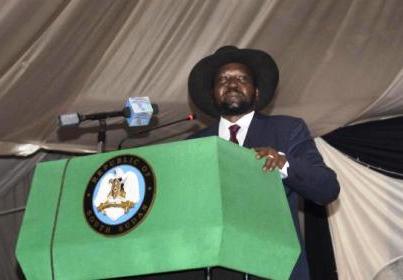Imposed peace caused resumption of war in S. Sudan: Kiir
October 12, 2017 (JUBA) – The South Sudanese President Salva Kiir has reiterated his rejection for external efforts oblivious of national dynamics, saying efforts that undermine internal initiatives and processes caused the resumption of the conflict in July 2016.

He added, “That is why when the peace was imposed, the result was what we saw in July last year. We do not want that to repeat itself”.
The South Sudanese leader, during his meeting with governors, also encouraged them to preach peace and forgiveness messages.
According to the president politicians who take up arms and later return to the country under internationally-imposed peace agreements, which often contain provisions that allow suck individuals to control armed groups have undermined peace efforts.
“The imposed peace arrangements create a situation of a continuous war and prolong the situation. In reality they do not address any situation. So we must try to encourage our people to participate in the national dialogue. This is a forum through grievances and the issues which were not addressed by the current peace agreement and other issues can be addressed,” said Kiir.
“It is not a political arrangement. The agreement was for political arrangements. It was intended to stop war between the government and those who took up arms against but the national dialogue as you know is to bring all the people together to discuss all the issues, starting from governance and other issues”, he explained.
Kiir, who heads the coalition government, said members of the national dialogue steering committee traveled to South Africa for retreat with the hope that his main political rival, Riek Machar, who is in exiled in South Africa, will give the team an opportunity to hear his views on how he and his group intend to contribute to the peace process.
“This is the opportunity any group with genuine issues would use. So Riek is serious about peace and want to contribute, I think he will not the dialogue committee return without meeting them. The committee came to me and they told they were going to try again this time. They said they will speak to the deputy president of South Africa to arrange the meeting,” stressed the South Sudanese leader.
He added, “I don’t know whether they have succeeded but I don’t think they have met because they just reached South Africa”.
In June, however, the eight- member Intergovernmental Authority on Development (IGAD), which leads regional efforts to end the four-year conflict, called for revitalization of South Sudan peace process.
The initiative is an attempt to revive the peace agreement signed in August 2015. Juba says it is committed to the implementation of the deal, but Machar and his opposition faction should not take part in this transitional phase and wait to participate in elections.
Last month, the head of United States aid arm (USAID), Mark Green asked the South Sudanese president to stop the war and allow unfettered humanitarian access. The U.S official was quoted saying Kiir denied that his forces were impeding the activities of aid groups.
One of the countries that recognized South Sudan’s independence in 2011, Washington played a key role in helping create the 2005 Comprehensive Peace Agreement (CPA) that laid the groundwork for the 2011 self-determination referendum, through which the people of South Sudan overwhelmingly voted for cessation from Sudan.
Currently, the US government remains the leading international donor to South Sudan and provides significant humanitarian assistance to hundreds of thousands of South Sudanese displaced or otherwise affected since the start of the country’s crisis in December 2013
(ST)
